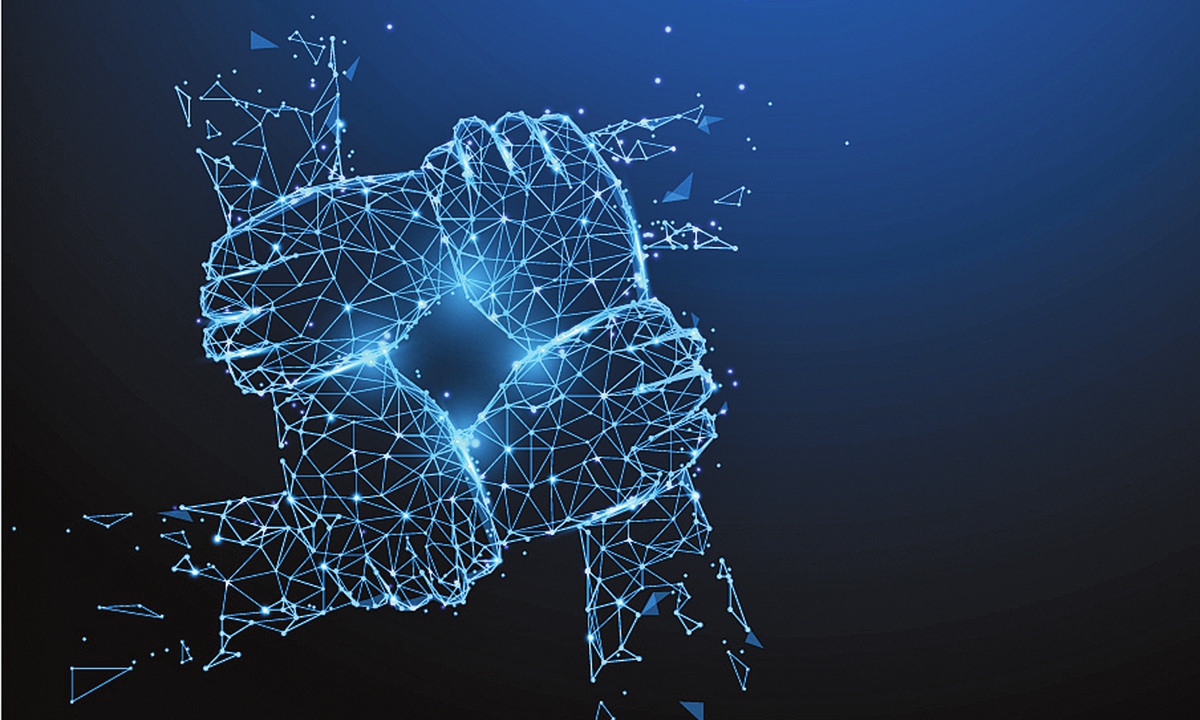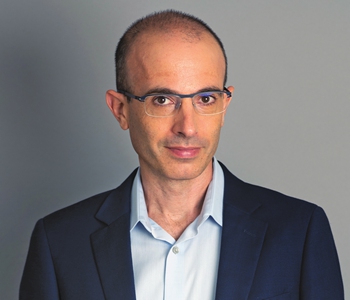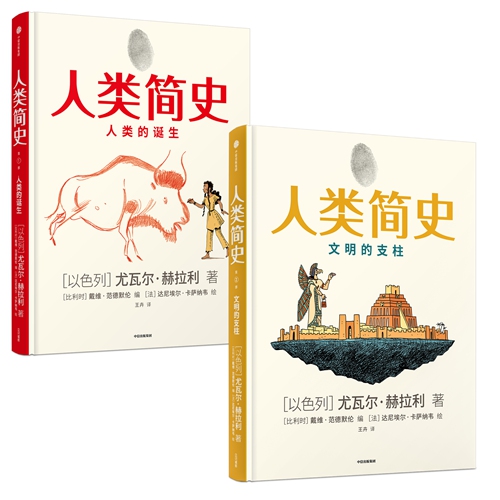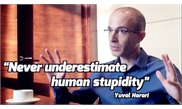World lacks enough political wisdom despite having scientific power: Yuval Noah Harari

Photo: VCG
Editor's Note:
Sapiens: A Brief History of Humankind, one of the world's best-sellers, has been re-choreographed into graphic novel series. As a historian, the author Yuval Noah Harari (Harari), who wants to bridge the gap between the scientific community and the general public, hopes to attract a wider audience through comics this time. "We have scientific tools," he said, but "we seem not to have the political wisdom" to use the tools, when commenting on the post-pandemic era. After the outbreak of the COVID-19 pandemic, are there any conclusions in his books that Harari may want to change? Is the world becoming flat? Or the other way around? Harari shares his views with Global Times reporters (GT) Li Aixin and Bai Yunyi in an exclusive interview.
GT: After your book was published, did you receive special feedbacks from China which are different from responses from other countries?
Harari: What struck me is the similarity between the feedback, the questions, that people from different countries gave, which implies that people from all over the world have similar concerns, similar interests. People are worried about the future, about things like climate change, about the rise of artificial intelligence. Wherever I go, whether it's China or Brazil or Europe, they ask about these things, and also about the past, the ancient past of humankind. Because all the identities that today dominate the world, that we feel define us, whether it's national identities like Chinese or Israeli or American, whether it's religious like Muslim, or Christian, or Buddhist, they're actually quite new.
All of these identities appeared only in the last 5,000 years, most of them may be appeared in the last 1,000 years. So when you go back 10,000 years to the agricultural revolution, or you go back even further, say 50,000 years, to the Stone Age, you come to an era when the world knew no Chinese and Israelis and Americans, no Muslims and Jews and Buddhists, people had very different identities.
So in a way going back so far in time enables us to see the world of today from a different perspective, which is deeper than that of any of the current identities.

Yuval Noah Harari Photo: Courtesy of Harari
GT: What inspired you to make a graphic novel series about Sapiens? Which group of readers do you hope to attract through comics?
Harari: The idea was to reach a wider audience. The latest findings of science and history are relevant to everybody, but not everybody reads or likes to read science books. So we looked for a way to reach more people, and also to experiment with a new way of telling science, of telling history. The subject matter is still science, and it's still very serious, sometimes even tragic. But the way of building the story is different.
One chapter, for example, is about the history of inequality and oppression. This is a very tragic and serious subject. But we present it using a fictional character which we created, Detective Lopez. She is a detective in the police, and the police is supposed to investigate crimes. So she goes after this crime, one of the biggest crimes in the whole of history - inequality and the oppression of people. She goes in an investigation: Who is to blame? What are the causes and sources of inequality in human societies?
This allows us to present the latest scientific ideas about the source of inequality, but not in a kind of very serious and heavy academic way, but rather as a kind of fun adventure story.
GT: After the outbreak of the COVID-19 pandemic, are there any conclusions or analyses made in your books that you may want to change or adjust now?
Harari: I'm not sure about changing. It's actually about emphasizing that the pandemic has shown us the great gulf between our scientific and technological power and our political limitations.
In previous eras in history, humans were helpless in the face of pandemic. When the Black Death, for example, spread in the 14th century, killing between 1/4 and half of the population of Asia and Europe and North Africa, nobody understood what was happening. Nobody knew anything about viruses and germs, or the immune system. And people thought that maybe it's punishment from God, or it's black magic, they were helpless.
Now, with COVID-19, it took just a couple of weeks to identify the virus and sequences, genome, and to understand how it causes disease and how it passes from one person to another. It took about a year to start producing vaccines to protect us.
We now have the scientific power to stop pandemics. But we seem not to have the political wisdom. Almost two years since the beginning of the pandemic, we still don't have a kind of global plan of action, how to stop the pandemic all over the world and how to deal with its consequences. Scientists produce the tools. But the politicians are the ones who need to make decisions on how to use the tools, and they didn't make very good decisions. So we have this imbalance between our scientific power and wisdom, and our political limitations.
This emphasizes the need for better global cooperation, because the COVID-19 crisis is essentially a global problem. No single country can solve it by itself. Even if you vaccinate all the people in your country, and they are protected, as long as the virus keeps spreading in other countries, it could mutate in a way to overcome the vaccine and become even more infectious or more dangerous.
So we need global cooperation. And we will need it even more to deal with other major challenges of the 21st century, much more complicated than COVID-19. If you think about climate change, that's a bigger, more complicated challenge. And if you think about the rise of disruptive technologies like AI, it has great promises, but it also has potentially great dangers to humanity. The only way to make sure technology is being developed for good and not for bad purposes is through some kind of global agreement and regulation. If we can't reach cooperation on COVID-19, what chance do we have of reaching cooperation on AI that's going to be much more difficult?
GT: You said you want to bridge the gap between the scientific community and the general public. What is your feeling when seeing the science too often being kidnapped by politics during the pandemic?
Harari: On the one hand, I understand it. This is history. This is human. It was always like this. Scientific truth sometimes is inconvenient for political purposes. People try to twist it. It was like this throughout history. I'm not surprised that it happens now with COVID-19 also.
In the kind of competition between truth and fictions and stories that people invent, the truth has two big disadvantages.
One is that the truth is often painful. People don't want to know the truth about themselves or their country or the world, because it contradicts some of those cherished beliefs or the political views. So they don't want the truth. And secondly, the truth is complicated. If you think about the pandemic. It's so complicated to understand something like a pandemic. We, as human beings, are not really built to understand it. We understand big things, big animals. But to understand viruses? Until a century ago, we didn't even know that viruses existed. A virus is not an animal. It doesn't eat, it doesn't reproduce by itself. It's just a bit of biological code that has the amazing ability to hijack the mechanisms of our own cells in our own body, and make the cells produce more copies of this biological code, which then gets spread and infects small cells.
That's such a complicated thing to understand. It's much easier to believe some conspiracy theory that somebody invented. People gravitate toward all kinds of conspiracy theories and fantasies and fictions, because you can make them simple. You can also make them pleasant. They are present in a good way that fits your political view. But it's dangerous. I hope that over time, we will develop the ability to not just to have better science, it's not enough, we need people to trust in science.
The key is institutions, because you cannot research by yourself all the questions. I have a PHD, I wrote books, I'm a historian, but I don't understand viruses. I have to rely on the work of other people. I don't know them personally. So how can I rely on them? I trust in the institutions to which they belong, could be a university, could be a newspaper, an academic journal. If I have a trust in the institution, and the institution publishes a report about a new epidemic or about a vaccine or anything, then I trust it because I know this institution is good.
Over time, it's important to have independent research institutions and independent publications that can research and publish the truth, even if it is inconvenient to some political power. Because then we learn how to trust it. And we know that even if something is very painful, is not pleasant, they will tell us the truth and we can rely on them.
GT: Are you pessimistic or optimistic about the future attitude of people, who politicize science, create or believe rumors… toward science?
Harari: I try to be a realist. I understand that humans have always politicized science. If you go back 100 years, you have all these so-called scientific racial theories that so-called scientists presented that said the white race is superior to the black race and the Europeans are superior to Asians. This was a complete distortion of science, but still many people, even some scientists believed it, and so this was a scientific truth. It's not something new that science is being politicized.
I think the situation today is actually better than it was 50 years ago or 100 years ago. I hope that the lessons of the pandemic will show people how dangerous it is to politicize science. Because once you politicize science, you can no longer trust the facts. Even if now they are telling you the truth, you just can't be sure. You get a vaccine, and you don't know if it's effective or not. You get a report about the spread of a new epidemic, and you're not sure whether to trust it. We see the same thing happening with climate change that we are now in a very difficult situation, because for too many years, people refuse to believe the scientific models and the scientific facts.
I hope that anybody who thinks of politicizing science now will look at these examples of the pandemic and of climate change and realize that maybe you will gain a short-term advantage by politicizing, by distorting this particular scientific truth, which is inconvenient for you. But in the long term, this is destructive for you and for the whole of humankind. So hopefully people will not do it.
Things are still quite bad, but they are somewhat better than they were 50 or 100 years ago or 1,000 years ago. If you take a longer review, and think in terms of centuries, not in terms of what happened this morning, you realize that actually, there is less violence in the world today than in any previous time in history. There are still wars in some place. I live in Israel. I come from the Middle East. I know perfectly well that there are still wars, but fewer than in any previous time. Similarly, if you think about epidemics, what's been happening in the last two years is terrible, but it's nothing compared to previous pandemic like the Black Death. The big difference now is that we have the scientific knowledge to understand what is happening to take effective countermeasures. The point is not to feel good or complacent. It should make us more responsible. It should make us work harder to improve things.
We should be responsible and make wiser decisions. In this sense, you can't really say whether I'm optimistic or pessimistic. I see both. It depends on our decisions. If we make good decisions, the world will be better.
But I'm fully aware, as a historian, that people sometimes make terrible decisions. You should never underestimate human's stupidity. It's one of the most powerful forces in history. You look back history and decisions people made, like World War II. Why did they have to start this war?
After WWII, more countries realize that in order to improve your situation, you don't need a war, but you still have historical examples of these terrible disasters happening, not because of some law of nature, but because of bad human decisions. There is no guarantee from history that it will not happen again in the 21st century.
GT: Some observers believe the world is becoming increasingly flat thanks to globalization. Yet during the pandemic, we have seen the gaps and contradictions among different countries, civilizations or ethnic groups getting wider and bigger. Do you think the world is now becoming flat or the other way around?
Harari: I think it became flat in previous decades. And now it's the other way around. I think the gaps between countries were closing in recent decades. But now they are opening again.
We are seeing more and more inequality in the world, both within societies, but also between societies, between countries. This is a very big danger. We also saw during the pandemic that some corporations, some industries actually had a very good time during the pandemic, becoming even more valuable than they were before. Whereas other corporations, sector of the economy, other countries are facing complete ruin.
We are now seeing a rise in global inequality. It manifests itself in many ways. We see, for example, that the automation revolution and the AI revolution is being led by a very small number of countries, whereas most countries are far behind. There is a danger that we will see again what we saw in the 19th century, with the industrial revolution.
In the 19th century, a few countries industrialized first. They gained the enormous power of modern industry of trains and steamships and modern weapons and things like that. And they used it to conquer and exploit the rest of the world. Very small number of countries, mainly in Western Europe, the US, Japan... they use the power of industry to conquer and exploit the rest of the world. It took other countries more than a century to start closing the gap.
Now it can happen again, with the new powers of AI and robotics and biotechnology, which are far greater than steam engines and trains.
Again, we might have a few countries, maybe different countries this time, that will be in a position to dominate and exploit everybody else, the entire planet. This time, maybe it will become impossible to close the gap. Because one of the things about the new technologies of the 21st century is that they favor the concentration of power in a very small place, in the hands of a very small number of people.
For much of history, the main source of power was land. Land is something that you can't concentrate in one place. It's just physically impossible to concentrate all the land in one place. In the last two centuries with industry, it became easier to concentrate power. But still, you couldn't really put all the factories, all the machines, all the mines in one place.
Now, the main source of power in the world becomes data, information, and the ability to analyze this information. And the thing about information is that you can concentrate all the information in one place, in one country, in one corporation and analyze everything there. The danger is that we will see much bigger inequality, a much bigger imbalance of power than anything we've seen before in the history of humankind.
GT: Speaking of the concentration of the information, some observers have been talking about the "scientific cold war". From China's perspective, the US tends to concentrate all high tech to itself and contain China's development in the high-tech field. Do you agree with the viewpoint that we are going through a scientific cold war or scientific decoupling? What might this mean to ordinary people?
Harari: Yes, I think that the danger of a new cold war, which will be also a scientific cold war, a digital cold war, is growing. Five years ago, it looked like a possibility, but a distant one. Now, it seems more and more like a reality.
It's not just a competition in science. It's about the competition in who controls the flow of information in the world. Because controlling the flow of information is the key to controlling the world itself. The danger here is that if we enter a new cold war of this kind, it doesn't really matter who wins the war. The loser will be humanity.
Because once you are in a situation of an arms race, let's say an (arms race of) artificial intelligence, you cannot regulate it. You cannot limit it in any way. Even if you realize it's dangerous to develop autonomous weapon systems, killer robots, it's very dangerous to develop technology that monitors and follows everybody all the time, to live in a kind of digital dictatorship, that everything you do, any moment is being monitored and recorded and analyzed.
Even if you realize it and you say we don't want to do it, it's a better idea, you are all the time afraid: We don't want to do it, but they are doing it. And we cannot allow them to go ahead of us. We cannot remain behind, so we must do it first.
The other side thinks the same thing. And then you have an arms race in things like killer robots. There is no restriction. Any attempt to create a regulation, a restricting regulation, you have the logic of the arms race - we can't trust them, even if we sign an agreement, and how do we know they don't develop some secret laboratory… so we must do it first. The result will be that instead of this technology being used to benefit humanity, as it should, it will result in destructive powers that might destroy human freedom and might destroy humanity itself. The only way to stop it is to defuse the tension between the leading countries.
Of course there is competition. That's just part of the world. You can't just abolish competition from the world, but there is a big difference between competition and war. It's a difference in how you view the other side and how you view the world. If we allow a new cold war to develop, especially between China and the US, this will be disastrous to humankind, not just because of the implications for the development of things like AI, but also because it will prevent taking effective action against other dangers like climate change. You can't really solve climate change without global cooperation. If China and the US and other countries are engaged in a new cold war or a new arms race, it will be extremely difficult to reach any meaningful agreement on how to work together to prevent climate change.
GT: You said the only way to prevent the scientific cold war is defuse tensions. Do you have suggestions about how?
Harari: I'm not an expert on politics, so I don't have a practical suggestion of an agreement or something they can reach. But again, from a broad perspective, I think both sides need to appreciate that this time, the survival of humankind depends on the actions they take. It's more than just traditional politics. It's really whether the human species will have a future and what kind of future it will have. I think the basic understanding should be that they are our competitors and our rivals, but they are not necessarily our enemies.
And one way to reach this position is to appreciate the viewpoints of the other side, not have this kind of feeling that our system is inherently superior to their system, and we should change their system to be more like ours.
GT: Some say that global geopolitics is going through a process of reshaping itself. The pandemic is accelerating the pace of the process. Are you willing to talk about your view on the pandemic's influence on the world's political pattern?
Harari: In the end, the influence of the pandemic depends not on the pandemic, and not on the virus. It depends on us, on the decisions that we make. We can react to the pandemic by blaming it on foreigners, on minorities, on others, and increasing the tensions in the world, refusing to cooperate, refusing to share information freely, and competing for the scarce resources, like medical equipment or vaccines.
If we go in the direction, if these are the decisions we take, then the impact of the pandemic will be to create a more disunited world, a world full of tensions, a world which will go in the direction of a new cold war and violence and so forth.
But we can take a different attitude or different reaction to the pandemic and realize that cooperation is the best way to deal with it. Instead of blaming foreigners, we need to cooperate with them, to trust them, to share information, to have a global plan, how to share scarce resources and how to deal with the economic consequences of the pandemic. If we do that, it will be much easier to deal with the pandemic itself. And it will also create a more harmonious, a more peaceful world afterward, which will make it easier to deal with future challenges, whether it's climate change or the rise of AI. Ultimately, it's not the impact of the pandemic. It's how we choose to react to the pandemic.

Sapiens A Graphic History, Volume 1: The Birth of Humankind (left)
Sapiens A Graphic History, Volume 2: The Pillars of Civilization

